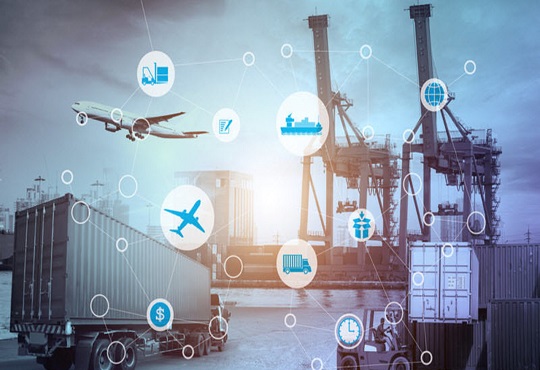
How AI is Improving Supply Chain Management
Vishal Pratap Singh | Saturday, 27 November 2021, 12:49 IST

In the recent years, it is seen that Artificial Intelligence is used for improving Supply Chain Management by extracting information, data analysis, supply and demand planning, autonomous vehicles and warehouse management. Several companies today, lack key actionable insights to drive timely decisions that meet expectations with speed and agility. “Cognitive automation that uses the power of Artificial Intelligence has the ability to sift through large amounts of scattered information to detect patterns and quantify trade-offs at a scale, much better than what’s possible with conventional systems”, says Indra Nooyi, CEO of PepsiCo.
Supply Chain organisations expect the level of machine automation in their supply chain processes to double in the next five years. The AI in supply chain market is expected to reach USD 10,110.2 million by 2025 from USD 527.5 million in 2017, at a CAGR of 45.55 percent during the forecast period 2017-2025. With increasing competition in a digitallyconnected world, it becomes even more critical to maximize productivity by reducing uncertainties of all kinds. Mounting expectations of supersonic speed and efficiencies between suppliers and business partners of all types further underscores the need for the industry to leverage the prowess of the AI in Supply Chain Management and Logistics.
Optimizes Warehouse Management
It is always seen that the warehouses have a busy and ever-changing environments. Artificial Intelligence has the ability to analyse warehouse processes and optimize the sending, receiving, storing, picking and management of individual products. Also, Artificial Intelligence helps to analyse fleet performance and ensure the right distribution channels to get goods to retailers and other customers in good time. Artificial Intelligence based systems accelerate traditional warehouse procedures, therefore removing operational bottlenecks along the value chain with minimal effort to achieve delivery targets.
Automate Logistics Operations
Along with optimizing warehouse operations, Artificial Intelligence also provide power to autonomous vehicles within distribution centres. Larger facilities often use robotic vehicles and tools to store and pick items. Artificial Intelligence helps them in choosing the most efficient routes. Industry experts predict that in the coming future, trucks may even become fully autonomous and thus reduce the dependency on human drivers.
Forecasts & Streamline Demand Beforehand
Artificial Intelligence is used to source and process data from many different areas and forecast future demand based on external factors. This feeds into supply and demand planning and product development. Artificial Intelligence analyses complex data to establish current patterns and future trends and then make decisions based on outcomes. It helps to manage the flow of goods throughout the supply chain, ensuring that raw materials and products are in the right place at the right time.
Shipping Efficiency
Faster and accurate transportation and on-time deliveries are the inevitable positive results of introducing smart technology solutions along the supply chains. Artificial Intelligence systems can help in reducing dependency on manual efforts, making the entire logistics process faster and more reliable. Smart planning and predictions based on various data sources help to facilitate timely delivery to the customers. Many companies believe that Artificial Intelligence has helped them in saving time and automating their employees’ mundane and repetitive tasks.
Customer Satisfaction
Artificial Intelligence is the technology which increases the customers’ satisfaction by streamlining the delivery process and making the product accessible within a short period of time. It helps in making the whole process transparent with status available at any time for the customers. By deploying AI, companies speed up their response time by empowering human computer interaction with chatbots and natural language processing.
Challenges Faced by AI in Supply Chain
Scalability
Usually, it is seen that most of the Artificial Intelligence and cloud based systems are quite scalable, the challenge faced here is the level of initial startup users or systems needed to be more impactful and effective. Since all AI systems are unique and different, there is something that supply chain partners will have to discuss in depth with their AI service providers.
Training Cost
As any new technology solution requires training which also needs significant investment in terms of time and money. This can impact business efficiency as supply chain partners will need to work with the AI providers to create a training solution that is impactful yet affordable during the integration phase.
Complexities of System
Artificial Intelligence based systems are usually cloud based and require expensive bandwidth which is needed for powering the system. Sometimes, operators also need a specialised hardware to access these capabilities of Artificial Intelligence and the cost of this AI specific hardware can involve a huge initial investment for many supply chain partners.
How’s the Future of AI in Supply Chain Management
There is still a lot to learn about Artificial Intelligence and the ways through which it can improve supply chain management. With the complex network of supply chains that exist today, it will become more critical for manufacturers to get complete visibility of the entire supply value chain, with minimal effort. Having a cognitive Artificial Intelligence driven automated platform will offer a single virtualised data layer to reveal the cause and effect, to eliminate bottleneck operations, and pick opportunities for improvement. All of this will happen using real time data instead of redundant historical data.
CIO Viewpoint
7 Thoughts on Preparedness for a Slow
By Robin Joy, CIO, V-Guard
Securing your Cloud Infrastructure - A Journey...
By Vishal Katial, VP - Information Technology, Ugam
Achieve Information Security with Converged...
By Deena Dayalan K, Director- IT, Sears India
CXO Insights
Managing Life Cycle - Key for Sustainability
By Jaiganesh Murugesan, Sr. Director, IT for Engineering and Supply Chain, GE Transportation
Futureproof your business with lasting agility
By Subrato Bandhu, Regional VP, OutSystems
Common Pitfalls to Avoid While Managing...








